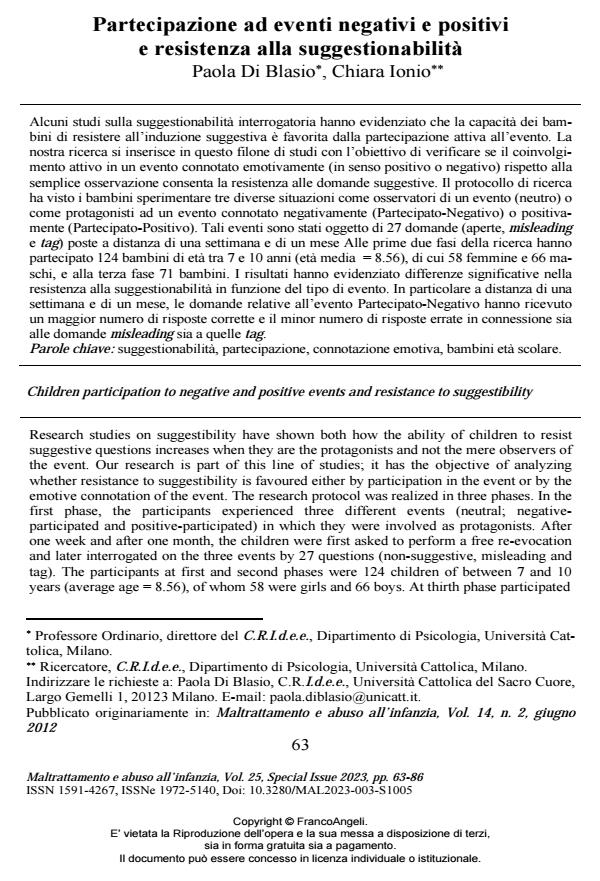Partecipazione ad eventi negativi e positivi e resistenza alla suggestionabilità
Titolo Rivista MALTRATTAMENTO E ABUSO ALL’INFANZIA
Autori/Curatori Paola Di Blasio, Chiara Ionio
Anno di pubblicazione 2024 Fascicolo 2023/3 Suppl.
Lingua Italiano Numero pagine 24 P. 63-86 Dimensione file 313 KB
DOI 10.3280/MAL2023-003-S1005
Il DOI è il codice a barre della proprietà intellettuale: per saperne di più
clicca qui
Qui sotto puoi vedere in anteprima la prima pagina di questo articolo.
Se questo articolo ti interessa, lo puoi acquistare (e scaricare in formato pdf) seguendo le facili indicazioni per acquistare il download credit. Acquista Download Credits per scaricare questo Articolo in formato PDF

FrancoAngeli è membro della Publishers International Linking Association, Inc (PILA), associazione indipendente e non profit per facilitare (attraverso i servizi tecnologici implementati da CrossRef.org) l’accesso degli studiosi ai contenuti digitali nelle pubblicazioni professionali e scientifiche.
Alcuni studi sulla suggestionabilità interrogatoria hanno evidenziato che la capacità dei bam-bini di resistere all’induzione suggestiva è favorita dalla partecipazione attiva all’evento. La nostra ricerca si inserisce in questo filone di studi con l’obiettivo di verificare se il coinvolgi-mento attivo in un evento connotato emotivamente (in senso positivo o negativo) rispetto alla semplice osservazione consenta la resistenza alle domande suggestive. Il protocollo di ricerca ha visto i bambini sperimentare tre diverse situazioni come osservatori di un evento (neutro) o come protagonisti ad un evento connotato negativamente (Partecipato-Negativo) o positiva-mente (Partecipato-Positivo). Tali eventi sono stati oggetto di 27 domande (aperte, misleading e tag) poste a distanza di una settimana e di un mese Alle prime due fasi della ricerca hanno partecipato 124 bambini di età tra 7 e 10 anni (età media = 8.56), di cui 58 femmine e 66 ma-schi, e alla terza fase 71 bambini. I risultati hanno evidenziato differenze significative nella resistenza alla suggestionabilità in funzione del tipo di evento. In particolare a distanza di una settimana e di un mese, le domande relative all’evento Partecipato-Negativo hanno ricevuto un maggior numero di risposte corrette e il minor numero di risposte errate in connessione sia alle domande misleading sia a quelle tag.
Parole chiave:suggestionabilità, partecipazione, connotazione emotiva, bambini età scolare.
Paola Di Blasio, Chiara Ionio, Partecipazione ad eventi negativi e positivi e resistenza alla suggestionabilità in "MALTRATTAMENTO E ABUSO ALL’INFANZIA" 3 Suppl./2023, pp 63-86, DOI: 10.3280/MAL2023-003-S1005